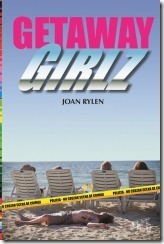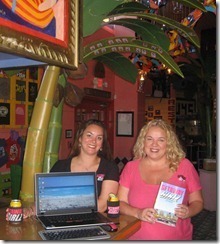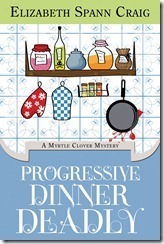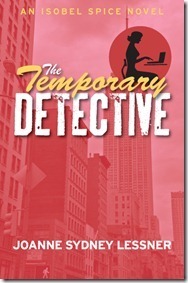Riley Adams's Blog, page 172
August 2, 2012
My Little List—Guest Post By Joanne Sydney Lessner
“As someday it may happen that a victim must be found, I’ve got a little list.”
--W.S. Gilbert
I’m planning to kill my neighbor.
Lest you fear that I’ve just made you an accessory before the fact, rest assured that no actual blood will be spilled, although I do have a particularly gory end in mind for this guy. He’s one of those of selfish, antagonistic neighbors—apartment-dwellers will recognize the type—who has no consideration for anyone else, yet complains constantly about the rest of us. And so, he must die. Most likely, in book three.
In the first installment of my Isobel Spice mystery series, The Temporary Detective, Isobel arrives in New York City eager to pursue her acting career. On the first day of her first temp job, she stumbles across an obnoxious, overbearing secretary dead in a bathroom stall, a pair of scissors buried in her ample bosom.
Okay, so who was this secretary really? Why, the woman who got me fired from my first temp job, of course! She thought I spent too much time yakking on the phone to my friends, which, admittedly, I did. I had the idea for my series shortly after that, although I didn’t write the book for almost twenty years. I guess you could say I hold a grudge, because even after all that time, she was still my first victim. I put her on the page—and then I killed her. [Insert maniacal laugh.]
Writers have always populated their fiction with thinly disguised acquaintances. D.H. Lawrence wrote an amusing poem on the subject, called “I am in a novel,” in which the protagonist is shocked to learn, via his fictional alter ego, what his author friend really thinks of him. After years living in New York, temping and working in the theater, I’ve filed away a handful of standout jerks whose demises I have been plotting for a while.
In the second Isobel Spice novel, Bad Publicity (due out early next year), Isobel temps in a public relations firm, where a troublesome consultant drinks poisoned coffee before a meeting. Wanna guess? That’s right: a demanding client who made my colleagues and me miserable, and then fired us. Off he goes into the beyond, dispatched with a not-so-accidental overdose of prescription drugs.
Which brings me back to my belligerent neighbor. Since Isobel’s third adventure is still in the planning stages, I hadn’t quite settled on my victim until the other day, when this guy did something particularly galling. In the unlikely event that he reads my book, chances are slim that he’ll recognize himself, despite being a class-A narcissist. Like most of us, he has little awareness of how others perceive him.
One of the great things about being a writer is having the power to create your own world and populate it with whomever you want. It’s a particular perk of the mystery novelist that you get to regularly de-populate it as well. From now on, every time I find myself trapped in the elevator with my neighbor, I can relish the secret knowledge that—at least on paper—he’s going to get what he deserves.
Joanne Sydney Lessner is the author of Pandora’s Bottle, a novel inspired by the true story of the world’s most expensive bottle of wine (Flint Mine Press, 2010) and The Temporary Detective (Dulcet Press, 2012). Joanne also enjoys an active performing career, and with her husband, composer/conductor Joshua Rosenblum, she has co-authored several musicals, including the cult hit Fermat’s Last Tango and Einstein’s Dreams, based on the celebrated novel by Alan Lightman.
July 31, 2012
Writing—It Doesn’t Have To Be Solo (Or Done In Quiet Places)--Guest Post by Johnell Kelley and Robbyn Hill
@JoanRylen
 Thanks Elizabeth, for having us today so we could share our crazy, co-author story with your readers.
Thanks Elizabeth, for having us today so we could share our crazy, co-author story with your readers.
Hey y’all! We are Johnell Kelley and Robbyn Hill, co-authors of Getaway Girlz, our debut novel, written under pen name Joan Rylen. We grew up together in Pasa “Get Down” dena, Texas, famous for the John Travolta movie, Urban Cowboy and the mechanical bull at Gilley’s. We lived five short streets from each other, and were side-by-side in all the same stuff: Brownies, dance, band, house-wrapping, boy-chasing. We stayed in touch after attending different colleges, both eventually landing in Fort Worth, which we still call home.
All of this togetherness has culminated into a series based (loosely) on the annual girls’ trips we take with two other longtime friends. The first trip was intended to rally around Johnell during her double-whammy life-changing events: her four-kids-under-four divorce in conjunction with the big 3-0. The trip was so fun we’ve kept up the tradition and have had as many of 11 girlz on the trips, but always the ‘core four.’
The novels are roughly-based on our trips because thankfully, we’ve never had a murder or other mysterious situation happen while on vaca. Good grief, no one would travel with us if we did! But we do go on location for “research” and always write some of our experiences into the books. Bucket dancing on a beautiful Playa del Carmen beach, white water rafting through the Royal Gorge in Colorado, slamming giant syringe shots on Bourbon Street and entering a pumpkin-dropping contest the Adirondacks are just a few of the tidbits that find their way into our novels. We’re excited about our fall trip that will help us with the details of book five…Lone Star SOMETHING (we haven’t decided yet!). Check out our website and you’ll no doubt find pictures of us yee-hawing around a dude ranch in Bandera, Texas.
The initial idea for a book popped into Robbyn’s head and wouldn’t leave her alone. The first time we sat down to work, we worked our way through a 12-pack of Dos Equis and the idea for the series was born. We laughed and laughed, recounting our crazy adventures and were hooked, never looking back.
We knew we could do this, and do it right. Granted, there were a lot of things we didn’t know, like what a literary agent was (or that we might need one). We had no idea about writing conferences, critique groups, e-pub files, Publisher’s Marketplace and a whole slew of other things that writers need to know about, but we jumped in laptop first, nonetheless.
We’ve learned a lot during the past three and a half years which improved our writing and lead us to the ginormous decision to self-publish. After attending a conference in NYC and pitching to four editors with the Big Six (three out of four requested partials), we received an offer from an agent for representation of our first three books, but decided that wasn’t for us. We’re pretty strong-willed girlz and the thought of losing control over so much through a major publisher didn’t sit well. Because of the industry standard with newcomers, we’d have to market the heck out of ourselves anyway, so we went for it.
We launched our first book this past June and to date have sold close to 600. We’ve had numerous signings at Barnes and Noble and are working to get the word out!
We’re on a tight deadline for book two, Rocky Mountain Mayhem, being released in December. Then, it’s nose to the grindstone for book three, Big Easy X-capade, to be released in June 2013.
 We write in restaurants and bars in downtown Fort Worth. We tried working in quieter spots, like at home, but Johnell falls asleep (mother of four!). We drink buckets of beer, margaritas, wine on occasion, and we’re productive (okay, up to a point), but it’s turned out to be great marketing for us. We get all set up with two laptops and “Old Bessie,” our external keyboard. People inquire as to what we’re working on or who our employer is since they let us work in bars. Often, after chatting and showing them what we’re working on they’ll buy a book. One of our favorite writing spots, Chuy’s, is framing a copy of the book and hanging it right by the front door. Woo hoo, love Chuy’s!
We write in restaurants and bars in downtown Fort Worth. We tried working in quieter spots, like at home, but Johnell falls asleep (mother of four!). We drink buckets of beer, margaritas, wine on occasion, and we’re productive (okay, up to a point), but it’s turned out to be great marketing for us. We get all set up with two laptops and “Old Bessie,” our external keyboard. People inquire as to what we’re working on or who our employer is since they let us work in bars. Often, after chatting and showing them what we’re working on they’ll buy a book. One of our favorite writing spots, Chuy’s, is framing a copy of the book and hanging it right by the front door. Woo hoo, love Chuy’s!
 Our approach to writing and publishing may not work for everyone but it was the best decision for us. Y’all watch out, we may be
Our approach to writing and publishing may not work for everyone but it was the best decision for us. Y’all watch out, we may be vacationing researching at a destination near you soon, and you never know what we’ll use for inspiration in the next book!
Adios!
Johnell & Robbyn
July 29, 2012
Tips for Finding your Writing Voice—Guest Post by Josephine Carr
by Josephine Carr, @ThreeKingsBooks
 Tips for Finding your Writing Voice
Tips for Finding your Writing Voice
When my writing career began thirty years ago, I got lucky. The young adult genre was just beginning, and the market was hungry for novels with teenage protagonists. This was a boon for any unpublished writer, of course, but the real luck was something else entirely.
By writing a young adult novel, I immediately found my voice.
In reading and mentoring other new writers, I recognize that their voice is often murky, or missing entirely. I’m not the first to say this, and I know you’ve read it all over the place, but here it comes again: voice is vital.
This is no joke. You can make any number of mistakes in plotting, character development, point of view, and theme, but if you haven’t found your voice, you will not be published. (Even if you self-publish, your success will always be limited.)
Voice is intangible, difficult to define, and impossible to teach, but if you have it, everything else you might do wrong will be fixable. So what’s a writer to do?
I have some practical suggestions.
(1) Write in the first person.
This can be instantly helpful to a writer searching for their voice. When I received an offer to publish my young adult novel, No Regrets, so many years ago, it was for one reason only. I sounded distinct and unassuming. This happened despite the fact that my prose style has never been lyrical or beautiful in any way. I am a prosaic writer, with a crisp style, but by writing a story that happened to be mildly autobiographical, and in the first person, I immediately tapped into my natural writing voice.
(2) Read your own writing aloud.
This is such an easy, yet profound, method for hearing what you sound like. As you read your prose aloud, you’ll be able to tell if it sounds like you. When the voice is off, it jars, often because there’s a pretentious quality, or there are simply too many words jostling for attention.
(3) Write from your stomach, not your mind.
By writing from your gut, as opposed to your conscious mind, you will find a voice that is compelling and real. When I begin writing a novel, I can literally feel my stomach speaking. I’m not being figurative or wishy-washy by this description. I mean it. My stomach seems to expand and send out messages. Indeed, it’s possible for me to feel ever so slightly nauseous, or a little squirrelly down there when I’ve begun and then realize it’s rolling along in a way I’d never have predicted. The words tumble out in a flow like water from a faucet. If/when that happens, I know I’ve got it. Let go of your doggone head and write from the stomach.
(4) Write for yourself.
I am a huge fan of story structure and planning out a novel because it will unquestionably enhance the reader’s experience -- I studied screenwriting, and I know it’s been an important factor in my success as a writer. But the architecture of a novel comes after you’ve found your voice. In the beginning of a novel’s composition, just write a sentence or two without thinking about anyone reading what you’ve written. Be loosey-goosey and relaxed.
Your voice doesn’t merely sound like you. Your voice smells, looks, and feels like you. Without it, your writing is like a cake that fails to rise in the oven. Flat, thin, compressed. And what makes a cake rise? Baking soda and beaten eggs, both of which form bubbles in the batter.
Your words are bubbles, and they lift us to create a buoyant world, uniquely you. When you write, be yourself, even if that self is somehow scary, a failure, or imperfect. Aren’t we all?
Josephine Carr is a thirty year veteran of traditional publishing (HarperCollins, NAL/Penguin, Dial Books for Young Readers) who’s thrilled to be relaunching herself under the banner Three Kings Books . She’d welcome your visit to her blog where she posts about how to write well, publish, and survive the trials of a writer’s life. The first mystery in her new series, The Rabbi’s Mother, will be published in September, 2012. Follow her on twitter @threekingsbooks.
July 28, 2012
Twitterific
by Elizabeth S. Craig, @elizabethscraig
Twitterific is a compilation of all the writing links I shared the previous week.
The links are fed into the
Writer’s Knowledge Base
 search engine (developed by writer and software engineer
Mike Fleming
) which has over 17,000 free articles on writing-related topics. Sign up for our
free newsletter
for monthly writing tips and interviews with top contributors to the WKB or
like us on Facebook
.
search engine (developed by writer and software engineer
Mike Fleming
) which has over 17,000 free articles on writing-related topics. Sign up for our
free newsletter
for monthly writing tips and interviews with top contributors to the WKB or
like us on Facebook
.
Have a great week!
Make Problems Actionable in Your Story: http://bit.ly/Mk0w6o @kid_lit
Different types/sizes of publishers with examples of each: bit.ly/MZU2q0 @annerallen
How to make a book trailer (video creation websites): http://bit.ly/O9PFKc @beth_barany
Narrative and the Moving Image: What Film Can Teach Us About Fiction Writing: http://bit.ly/O9PGy1
An agent on the new contractural language she's seeing from publishers: http://bit.ly/NDOXVg @rachellegardner @Porter_Anderson
The anatomy of a good website: http://bit.ly/Q44Ny7 @danyelleleafty
There is No Elevator to Success. You Have to Take the Stairs: http://bit.ly/OEFRpL @jodyhedlund
The cons of series writing: http://bit.ly/Ll92m5 @JeffSalyards
How not to be a successful self-pub author: http://bit.ly/N28t1z @ava_jae
Writing Series: The Cliffhanger Dilemma: http://bit.ly/Ml4N53 @erin_bowman
Tips for Dealing with Bad Book Reviews: http://bit.ly/PMKtjw @goblinwriter
A BookStats report of trade sales for 2011 (strong ebook showings): http://bit.ly/NDRq1Q @Porter_Anderson @pkafka
International Thriller Writers--can self-published writers apply? http://bit.ly/NDRuyw @Porter_Anderson @jamesscottbell @RobertBidinotto
What You Can Learn About Writing By Writing Thrillers: http://bit.ly/MgF0RY @nickthacker
The Social Life of a Writing Residency: http://bit.ly/Mf99M0 @PatrickRwrites
9 Simple Ways To Be a Better Writer: http://bit.ly/NDShQc
Great Reasons to Consider Skipping Over a Superhero Origin Story: http://bit.ly/NDSmU1
Worldbuilding--social roles of children: http://bit.ly/NDSMtB @juliettewade
5 helpful writing tips: http://bit.ly/NDT3N8 @mooderino
What's the Future of Publishing? http://onforb.es/NDT9Eu @forbes
Your Publisher Has Folded...Now What? http://bit.ly/NDTpDp @brandontietz
The need to reinvent ourselves as writers (particularly after a book's failure): http://bit.ly/MuOAwU
Laying Easter eggs in our stories: http://bit.ly/MuOBkj @writing_tips
Learning Writing Skills from X-Men: First Class {spoilers}: http://bit.ly/MuOEMV
Different types/sizes of publishers with examples of each: http://bit.ly/MuOEMV @annerallen
8 marketing essentials for writers: http://bit.ly/MuOPYH @writersdigest
What to Do When You Need to Cut a Major Part of Your Novel: http://bit.ly/MuPhpX @janice_hardy
Bringing your settings to life: http://bit.ly/MuPmtL
George Orwell's Four Motives for Creation: http://bit.ly/MuPtFJ @brainpicker
4 Steps to Starting a Thriller: http://bit.ly/MuPwkJ @writersdigest
The Amazing Spider-Man Beat Sheet {spoilers}: http://bit.ly/MyA4Yy
A Brief History of American Bookmobiles…in Pictures: http://bit.ly/MuQ1eK @readingape
Publishers should work on relationships with writers: http://bit.ly/MyAeiK @passivevoiceblg
5 traits of Pulitzer winning books: http://bit.ly/MNn7F5 @joebunting
A critique of a scene that's intended to show desperation: http://bit.ly/MNndwF @janice_hardy
4 Personalitiy Types For Characterization: http://bit.ly/MNni3g
Why writers need editors: http://bit.ly/NDYNrC @woodwardkaren
How to write your first cookbook: http://bit.ly/NonY4c @guardianbooks @alicecooks
5 tips to avoid distractions while writing: http://bit.ly/Noo6k7 @annelyle
Beyond the Most Common Fiction Mistakes: http://bit.ly/Noo8IV @thecreativepenn @victoriamixon
Writers and business: http://bit.ly/NoodMF @kristinerusch
Beta reading and collaborations: http://bit.ly/NDZ0Ls @bookviewcafe
Character building tips: http://bit.ly/NDZcdA @donnanewtonuk
Tips for Writing a Synopsis: http://bit.ly/NooEqc @noveleditor
Social Media vs. a New York Times Book Review Cover: Which Sells More Books? http://bit.ly/NooMpF @annerallen
10 Questions Your Readers Shouldn't Have to Ask: http://bit.ly/NooNKg @KMWeiland
Nail Your Novel – the DH Lawrence way: http://bit.ly/NooWxh @dirtywhitecandy
10 Tips For Creating An Audio Book: http://bit.ly/Nop1kI @thecreativepenn
What 1 writer has learned about marketing: http://bit.ly/NDZwZZ
The madness of marketing: http://bit.ly/Nop53T @AlexSokoloff
Languages In Fantasy: http://bit.ly/Oi3lTK @fantasyfaction
Scandinavia's Crime Lords: Stockholm's Salomonsson Agency: http://bit.ly/Oi3mXO @pubperspectives
Agent touting on Twitter? http://bit.ly/Oi3sP8 @nicolamorgan
Secrets of Blog Posts that Get Tons of Comments: http://bit.ly/Oi3wOM @JFBookman
When Your Passion Kills Your Plot: http://bit.ly/Oi3w1m @storyfix
Tips for rekindling your creative spirit: http://bit.ly/Oi3BCd
10 Reasons to Self-Publish–No More Excuses: http://bit.ly/Oi3A0Y @livewritethrive
How to make a book trailer (video creation websites): http://bit.ly/O9PFKc @beth_barany
Is Ignoring The Importance Of Setting Killing Your Novel? http://bit.ly/NGsaqf @bubblecow
How to Impress the People You Interview (and Be Professional): http://bit.ly/NWmeyQ @thewritermama
Failure Is Good for You: http://bit.ly/Oi3SoB @SF_Novelists
A quick method for creating your own images: http://bit.ly/Oi3Tcf @KarenCV
3 tips for editing your own work: http://bit.ly/Oi3XbN @AnselmAudley
Removing Elements to Fix a Problem Scene: http://bit.ly/Oi3XZr @Janice_Hardy
How to Get Your Self-Published Books Noticed: http://bit.ly/Py57mt @howtowriteshop
Establishing Ramifications: http://bit.ly/OicE5S @kid_lit
A list of 10 helpful books for writers: http://bit.ly/OicJqg
Character Names: How Do You Choose? http://bit.ly/Py5BJk @ava_jae
The gift of feedback: http://bit.ly/OicSu0
How a crisis helped a writer learn about the role of stories: http://bit.ly/Py5ZYa @Jan_Ohara
From Caricature to Character: http://bit.ly/Py66mv @KatieGanshert
12 Essential Social Media Cheat Sheets: http://on.mash.to/NtpC4v @mashable
The author's (minor) role in cover creation at trad. pubs.: http://bit.ly/NtpRMR @PaulTobin
5 Ways to Balance Writing and Life: http://bit.ly/NtpWA8 @writersdigest
How to Turn Rejection into a Positive Experience: http://bit.ly/Ntq2rx
Different types/sizes of publishers with examples of each: http://bit.ly/MuOEMV @annerallen
How to make a book trailer (video creation websites): http://bit.ly/O9PFKc @beth_barany
19 Ways To Grow Your Twitter Following: http://bit.ly/NtqfLj @woodwardkaren
The differences between commercial and literary fiction: http://bit.ly/NtqjuE @AnnieNeugebauer
How Facebook Advertising Works for Authors: http://bit.ly/NtqoOS @goblinwriter
Writing A Bottle Scene: http://bit.ly/Ntqt5m @mooderino
Ebook sales aren't a zero sum game: http://bit.ly/NtqypC @JAKonrath
10 dialogue tips: http://bit.ly/Ntu4QR
Marketing a Screenplay: http://bit.ly/Ntu6bt @writersdigest
Tips to prepare for a TV appearance: http://bit.ly/Ntv5Z6
Learning Writing Skills from Green Lantern {spoilers}: http://bit.ly/NtvcE6
Owning your goals as a writer: http://bit.ly/Ntvefe @4YALit @MeaganSpooner
6 tips for regaining your writer's voice: http://bit.ly/Ntvn2c @deewhiteauthor
8 Types of Parenthetical Phrases: http://bit.ly/Ntvlr1 @writing_tips
Planning for 1099-Misc: http://bit.ly/NWtaYQ @authorems
6 Ways to Drive More Pinterest Engagement: http://bit.ly/NWteaZ @smexaminer
How to talk about your work with acquaintances: http://bit.ly/NWtoiA
Why write fantasy? http://bit.ly/NWtV48 @dan_hanks
J.R.R. Tolkien's Top 10 Tips for Writers: http://bit.ly/NWucnL @JonathanGunson
Author Etiquette 101: How To Support Readers: http://bit.ly/NWuHy4 @jodyhedlund
3 Ways Book Publicity is Like a Zip Line: http://bit.ly/NWuTxw @WriterCrys
23 Ways to Defeat the Sagging Middle: http://bit.ly/NWv7V9 @fictionnotes
Harlequin Fail Part 2: http://bit.ly/NWvy1I @JAKonrath
My self-pub observations so far: http://bit.ly/Q3zHkL
A family vibe shouldn't be your litmus for signing with a publisher: http://bit.ly/O9mMBp @behlerpublish
The importance of good cover copy: http://bit.ly/O9nC15 @deanwesleysmith
Branding for Writers: http://bit.ly/O9nKOd @diymfa
Do you have a fear of success? 3 tips for conquering it: http://bit.ly/O9ocvK @threekingsbooks
8 tips for making time to write: http://bit.ly/O9oF0U @juliettewade
Publishing vs. Authors? http://bit.ly/NGS28t @Porter_Anderson @EmilySuess @PeterTurner @MirabilisDave
A writer on being authentic online: http://bit.ly/O9oMcS @indieauthor
Tips for stronger ebook sales: http://bit.ly/O9p4jX @woodwardkaren @JAKonrath
Salvador Dali's Creative Thinking Technique: http://bit.ly/O9poPI @MichaelMichalko
Afterward vs. Afterword: http://bit.ly/O9pwi4 @write_practice
What should writers do when faced with contradictory reasons for rejection? http://bit.ly/O9reQK @nicolamorgan
A BookStats report of trade sales for 2011 (strong ebook showings): http://janefriedman.com/2012/07/19/writing-on-the-ether-47/#2 @Porter_Anderson @pkafka
Thoughts on chapter length: http://bit.ly/O9uZpj
A look at theme, using "City Slickers" as an example: http://bit.ly/O9v78g @livewritethrive
Some self-publishing sales stats and tips for higher sales: http://bit.ly/O9wvaW
Beginner's Guide To Hiring A Freelance Editor: http://bit.ly/N2QAu2 @CA_Marshall
What Every Writer Can Learn From Regency Romance: http://bit.ly/N2QMJD @novelrocket
21 Top Links to Book Fonts for Self-Publishing: http://bit.ly/N2QOBr @JFBookman
50 Things 1 Writer Learned At Thrillerfest 2012: http://bit.ly/N2QTVJ @thecreativepenn
12 reasons to self-publish: http://bit.ly/N2SRoQ @RachelintheOC
10 steps to fill plot holes: http://bit.ly/N2T63j @howtowriteshop
Tips for starting out with a platform: http://bit.ly/N2TWNG @janefriedman
The Romantic Tension Recipe: http://bit.ly/N2U2F1 @TaliaVance
Try not to overthink your stories: http://bit.ly/N2UoeF @jamietr @janice_hardy
Sen. Schumer's WSJ op-ed piece? 'Maddening': http://bit.ly/PN99r6 @brianoleary @ChuckSchumer @Porter_Anderson
20 Words with More Than One Spelling: http://bit.ly/N2Ut23
International Thriller Writers--can self-published writers apply? http://janefriedman.com/2012/07/19/writing-on-the-ether-47/#1 @Porter_Anderson @jamesscottbell @RobertBidinotto
Book trailers--tips for finding viewers: http://bit.ly/N2UOSf @beth_barany
Why Your Hero Needs a Yappy Sidekick: http://bit.ly/N2VEyz @KMWeiland
The One Thing That Will Make Your Query Letter Stand Out: http://bit.ly/N2VKWX @krissybrady
7 Deadly Sins of Querying: http://bit.ly/N2WoDQ
Removing the YA Label: http://bit.ly/N2YG5U @pubperspectives
Using the realities of the past to unearth the fiction of tomorrow: seeking Lemuria: http://bit.ly/N2YQKp @genelempp
7 Key Things You Need for Your Blog: http://bit.ly/PnGCHK @NickThacker
Hard work is the key to success in both trad. pub and self-pub: http://bit.ly/PnHwUW @behlerpublish
Help for pacing problems: http://bit.ly/PnHNqN @roniloren
Top 10 homes in literature: http://bit.ly/PnIm3X @guardianbooks
Sen. Schumer's WSJ op-ed piece? 'Maddening': http://bit.ly/PN99r6 @brianoleary @ChuckSchumer @Porter_Anderson
The Top 10 Reasons to Avoid Writing Fiction: http://bit.ly/OLMy9P @BTMargins @lgreffenius
Forget the self-pub stigma and go for it: http://bit.ly/PRkwuM @JanetBoyer
Even editors need a book designer: http://bit.ly/OjkJHA @P2P_editor
Prologues--A Cautionary Tale? http://bit.ly/NGWhRo @Kathy_Crowley
Voice: the elusive but critical ingredient of powerful fiction: http://bit.ly/NthTDG @JodieRennerEd
Rounding out characters by adding subplot problems for them to iron out: http://bit.ly/Ntmzt7 @mkinberg
The Top 10 Reasons to Avoid Writing Fiction: http://bit.ly/OLMy9P @BTMargins @lgreffenius
Tips for adapting your book for a screenplay: http://bit.ly/OLOdfN @GrubWriters @jenna_blum
July 26, 2012
Planning Your Novel—Guest Post by Mike Fleming
by Mike Fleming, @hiveword
 I enjoy mountain biking. It’s simultaneously exciting and great exercise. When I’m not worrying about breaking bones or dying it’s actually very peaceful and I get a lot of great ideas. While the trail in the image is not very picturesque it’s in my backyard so I ride it often. If you’ll notice, though, the trail just seems to drop off. Does it keep on going or is it a three foot drop off? 50 feet? Are there a bunch of rocks there? A nest of ticks? (I hate ticks!)
I enjoy mountain biking. It’s simultaneously exciting and great exercise. When I’m not worrying about breaking bones or dying it’s actually very peaceful and I get a lot of great ideas. While the trail in the image is not very picturesque it’s in my backyard so I ride it often. If you’ll notice, though, the trail just seems to drop off. Does it keep on going or is it a three foot drop off? 50 feet? Are there a bunch of rocks there? A nest of ticks? (I hate ticks!)
Cliffhangers are great for readers but for writers? Not so much.
Fortunately, on this trail I know where I’m going and what to expect when I get there. So, I know that I can pedal my bike as fast as I want and just fly along this section without worry. It’s a beautiful thing.
It’s the same way with writing. Knowing where you’re going makes the whole process more efficient. More productive. Plus, you’ll spend much less time doing rework and untangling messes you’ve gotten yourself into.
Don’t believe me? How about James Patterson? He releases up to nine books a year. How does he do it? Organization and outlining the story first is what allows him to pump out novels quickly. (Well, having co-writers certainly helps, too.) Outlining is an efficient way to capture and revise a story at a time when changes are less costly in terms of time and rework.
Many writers worry that outlining takes the art out of writing. I’ve never understood that. Specifying the story in the form of an outline or bullet points is itself a creative process. Then, the real art, perhaps, is actually writing the story using the framework provided by the outline. There’s still a lot of room for the muse to shine during both phases.
How about some concrete examples? P. Bradley Robb outlined (ha!) the reasons why writers should outline their stories first:
1. Establish clear motives
2. Separate major plot from minor plot
3. Spot plot inconsistencies before they pop up
4. Enhance foreshadowing
5. Keep your story on track
In the article he elaborates on each point but you can see at a glance that there are some obvious benefits to planning your story.
Why not try outlining your next project to see if it works for you? There are many different ways to do it:
1. A traditional outline (Look, Roman numerals!)
2. Index cards
3. Spreadsheets
4. Custom novel writing software
Really, there’s no wrong way -- it’s up to your personal preferences and what works for you. The first three are common and well-understood but all four have their strengths and weaknesses.
As the creator of my own novel writing software, Hiveword, I’m particularly partial to applications tailored to the purpose. With Hiveword, for example, you don’t deal with an outline in the traditional sense but rather work with the components of a novel. You deal with scenes, characters, settings, and plotlines -- concepts that translate directly to writing a novel. For each scene you’d write a few sentences or a larger summary to describe the scene. Then when you’re done you effectively have an abridged story from which to build. Plus, you know where and when everything is at a glance.
Unlike a spreadsheet, however, Hiveword understands what you’re trying to do and can thus present your work in a sensible way and make it both easy to manipulate and visualize. Add a character to a scene with a click. Sort your scenes by drag and drop. See how your subplots weave in and out of your story. Have a look at the screenshots and you’ll see what I mean.
If you’ve never planned your story before perhaps now is the time to give it a try with whichever approach you think would work best. I’d love to hear from you about how it worked out or tips and tricks you use for planning your novel.
Happy trails!
Mike Fleming is the creator of the Writer ’ s Knowledge Base and Hiveword which is his online novel - writing software . He blogs about technology and writers and tweets at @ Hiveword .
July 24, 2012
A Few Self-Publishing Thoughts and Discoveries
by Elizabeth S. Craig, @elizabethscraig
 My income from self-publishing has varied since I first put a title up last August and followed it with another in November.
My income from self-publishing has varied since I first put a title up last August and followed it with another in November.
I've seen income as high as several months at about $1700 monthly income for one title.
I've seen it as low as $350 ,total, one month for two titles.
I don’t do any advertising. I don't have time to mess a lot with the price or to put well-placed ads on reader-oriented sites. I haven't done cool things like teasers for the next book in the series at the end of each book. I don't tweet or Facebook my books. I don't force Amazon to list books for free by having them run free on Smashwords. I haven't blog-toured during these releases or held giveaways or run contests. Basically, I'm not doing any of the things I'm supposed to be doing, as a smart self-published author, because I'm always scrambling to hit my deadlines.
So...when sales fluctuate wildly, it's not really the result of something I've done. But, as I'll explain below, it can result from what I haven't done.
I just do exactly what you see me do—blog,
tweet, update Google +, and use Facebook (although I don’t Facebook
much). These promotional things that I do are usually focused on writers, not readers. I'm a little shy with readers.
I'm obviously not becoming one of those Kindle millionaires we're always reading about. Although the extra income is more than welcome.
I'm frequently completely puzzled by my results--both good and bad. This week, I saw Dyeing Shame go to #7 on the Amazon women sleuth's chart...above one of Janet Evanovich's. Yeah, it was priced at $.99 to get attention....but it had been at that price for a couple of months. I have absolutely no idea what made the thing suddenly jump up the chart like that. I understood the surge in sales last month, when I had a new release from Penguin. But why in July? So I'm tracking to make more in sales this month for both books than I usually do.
What seems to bring in more sales:
1. When I’ve got one book priced at $.99 and another priced at either $2.99 or $3.99. I’m not saying this is the right thing to do…but I’ve made a lot more money when this has been the case. So, when I’ve had a loss leader (using grocery store parlance), I’ve had higher volume of sales and more general income.
2. When I’ve had a traditionally published release and then have had a book for $.99 and one priced (moderately) higher.
A note: I’ve made more money following a traditionally published release in my own name (i.e., the recent Quilt or Innocence release) than following a release with a pen name (the November 2011 release of Hickory Smoked Homicide as Riley Adams.) This tells me that readers are looking for other books under my real name.
Sales were brisk the first full month after I launched each self-pubbed title. I'm imagining this is due to the fact that I'm writing for a particular subgenre (cozy/traditional mystery) and when there are new books available in that niche, readers are immediately downloading them.
My costs for the projects were recouped in the first month for one book and about a month and a half for the other. Again, this is specific to me and my own experiences. But on average I put in about $550—$600 upfront on the books (editing, covers, formatting).
My main discovery from this process is that I do need to keep track of the sales. I don’t do this for my traditionally published titles—I avoid sales figures at all costs and just focus on writing the best books I can. But for self-pub, when you’re the one in charge of visibility and sales for the title, you need to check in at least once a month. If sales are slow, try something different...probably in regards to pricing. Otherwise, it’s likely going to continue a downward spiral. This is what happened that really slow month that I referenced at the start of the post. I was struggling under a couple of deadlines a few months ago and paying absolutely no attention whatsoever to what was going on with those books. They were both priced at $3.99 and fell in rankings and I never even spared a moment to glance at Amazon to check on them.
From a production standpoint, I’ve learned that I have to think ahead in terms of reserving editors, artists, and formatters. Last year I was ready to put my first self-published book through the production process and everyone I contacted was busy. This time I will contact everyone on my team before I complete my final draft.
I’ve been somewhat unprepared for readers who’ve contacted me asking about print editions of the Myrtle Clover books. A few readers who started reading the series with the trade paperback debut several years ago have been upset, actually, that I had e-versions only of the books and no print copies. I tried to make it up to several by sending them a free PDF of the ebooks. I'm not in the business to alienate readers. I may need to reconsider using CreateSpace.
Although some authors have relished the feeling of complete control over their book that self-publishing provides, I don’t enjoy it that part of it as much….that’s because I’m just so busy in both my personal and professional life that I don’t enjoy scraping together time for the nuts-and-bolts of the production process. I’m happy handing it over to people I've vetted and trust.
What I've found incredibly gratifying is the response from readers. They've bought the books, they've emailed me and Facebooked me. They've enabled me to continue writing a series that had basically ended in 2009. Their interest in the series has encouraged me to keep writing Myrtle Clover books and spend more time with a character I enjoy writing. And the extra income has been nice, too.
I'm thinking that niche books with built-in, dedicated audiences (like cozy mysteries) tend to do well with self-publishing. It certainly doesn't hurt, in my observations, to have traditionally published books releasing regularly, either.
If you’ve dipped your toes in the self-publishing pool, what have you learned? What are your thoughts on it so far?
July 22, 2012
What Traditional Publishers Offer—and What They Don’t
by Elizabeth S. Craig, @elizabethscraig
 Recently, I’ve realized through emails and direct messages that there’s sometimes some confusion about what traditional publishers offer writers.
Recently, I’ve realized through emails and direct messages that there’s sometimes some confusion about what traditional publishers offer writers.
The reason this concerns me is because I get the impression this is causing some writers to pursue traditional publishing when they might otherwise have chosen to self-publish.
One person who contacted me about my thoughts on ing mentioned that they didn’t have much money for promo and needed a traditional publisher so that the publisher could take care of all of that.
Others have thought that publishers send authors on books tours and set up their websites and social media for them.
Others have had fairly grandiose ideas about the size of an advance for a typical genre novel from a debut author.
What I’d like to do with this post is to tell what my experience as a midlist writer with both a major publisher and a midsized press has been. If you have a six-figure deal with a publisher and a high concept novel, this won’t apply to you.
In my experience, traditional publishers have:
Edited: They’ve done both global/developmental editing and proofreading. If you read all the editorial notes and changes in your submitted manuscript, you can get quite an education…for free.
Provided covers: These covers have been created by either an in-house art department or sub-contracted to artists that the house uses.
Promoted: They have submitted review copies to major book reviewers (Kirkus, Publishers Weekly) and industry magazines. They’ve included the books in the publisher’s catalogue. They’ve sent copies to the most well-read book bloggers for my genre. Upon request, they will send copies to smaller newspapers who want to write a review or a story (local papers, for instance.)
Distributed and provided good shelf-placement: They’ve distributed copies of books to bookstores and, in my case, provided extremely good shelf-placement for them.
Intervened with issues: When I’ve had a problem with something to do with social media (for example, I had a migration issue with Facebook), they’ve intervened for me directly with the platform/service and gotten quicker results.
Provided promotional copies of my book: Provided me with free copies of my books for my own promo purposes. I receive, per my contract, ARCs for the first book of a series, and author copies prior to the book’s release. If the book goes to large print, etc., I receive copies of those books as well.
They have not:
Provided promotional materials for me. If I want bookmarks, pamphlets, or business cards, I purchase them myself.
Set me up with a website or other social media platforms. We’re on our own with this one…and they’d like for us to have an online presence.
Sent me on a book tour.
Paid for me to attend conventions or conferences.
Paid me large advances on books. If you’re a debut genre fiction author, it would not be unreasonable to expect a $5,000 advance for each book (in some genres, like mystery, you’ll get a 3 book deal) and then royalties once you earn out. Your mileage may vary, but just a heads-up in case you’re planning on paying off your car loan with your advance. It would be best to think of your book money, as a debut genre writer, as something to provide extra money to your regular income (wherever your regular income comes from.)
This advance money is usually not paid out all at one time. In my case, the money I receive for an advance is in three parts: a portion when I sign my contract, a portion when I deliver the manuscript and it’s accepted, and a portion when the book is published.
Remember, if you have an agent, your agent will generally receive the publishers' checks and take 15% of the check as payment (if they negotiated that particular contract).
Royalties may be paid out every six months (or quarterly, depending on your publisher) along with sales statements and you might reasonably expect to make 8% of the publisher’s suggested retail price on a mass market paperback. You might expect to receive 25% of the amount received by the publisher (this is net income received by the publisher) on digital copies sold of the work.
Obviously, this is a much smaller amount than Amazon, for instance, would currently pay in royalties for a book priced at $2.99 and above (they pay 70% royalties for sales of these ebooks.)
Again, this information is specific to my own experience working with a midsized press (Midnight Ink) and a large publisher (Penguin) and in writing genre fiction. Some publishers pay larger advances for new writers, but then it can be harder to earn-out (and you want to earn out, if you’re writing for a traditional publisher.)
This post is not intended to negatively reflect on traditional publishing—it is what it is. There are pros and cons of writing for a publishing house. But if, for instance, you write science fiction/fantasy, romance, or mysteries and you’re trying to decide whether you want to pursue traditional publishing or self-publishing, hopefully this will give you some additional information to help make your decision.
Looking back over this post, I guess you could say the biggest pros for traditional publishing are that you get your editing and covers and store distribution for free and that you receive some payment in advance. The cons would be that you don’t have as much control and you could potentially make more money long-term by publishing a book yourself (if the book is good and if it finds an audience).
Cons for self-publishing would be the initial investment for editing and covers (which can potentially be recouped later in the process), frequent lack of presence in brick-and-mortar stores, and no advance payment. Pros for self-publishing would be the potential to make more money in the long-term and more control over the product itself.
I think that the right path to take depends on the book and the writer and what works for one writer or one book may not work for another writer or another book. (How’s that for noncommittal?) :)
If anyone would like to ask a question, I could try to answer it out of my own experience. Or if anyone would like to share their own experiences with either traditional or self-publishing—as a way to supply information to other writers—I’d love for you to chime in.
Wednesday I'll talk a little about some of my recent results with self-publishing (again in the for-what-it's-worth department). :)
Image: Frank McMains c.c.
July 21, 2012
Twitterific
by Elizabeth S. Craig, @elizabethscraig
Twitterific is a compilation of all the writing links I shared the previous week.
The links are fed into the
Writer’s Knowledge Base
 search engine (developed by writer and software engineer
Mike Fleming
) which has over 17,000 free articles on writing-related topics. Sign up for our
free newsletter
for monthly writing tips and interviews with top contributors to the WKB or
like us on Facebook
.
search engine (developed by writer and software engineer
Mike Fleming
) which has over 17,000 free articles on writing-related topics. Sign up for our
free newsletter
for monthly writing tips and interviews with top contributors to the WKB or
like us on Facebook
.
Have a great week!
A publisher with series criteria and whether you should pitch all the books when querying: http://bit.ly/NIsbfc @behlerpublish
Tips for bookstore events: http://bit.ly/PMJW0T @kalayna
Creative writing *can* be taught: http://bit.ly/PMKa8i @GuardianBooks
Penelope Trunk interviewed after choosing self-pub instead of trad.: http://bit.ly/NDP3Ms @penelopetrunk @laurahazardowen @Porter_Anderson
When your book doesn't sell: http://bit.ly/PMKjIW @79SemiFinalist
Tips for Dealing with Bad Book Reviews: http://bit.ly/PMKtjw @goblinwriter
The Origins of Creative Insight & Why You Need Grit: http://bit.ly/PML2tw
An agent on the new contractual language she's seeing from publishers: http://janefriedman.com/2012/07/19/writing-on-the-ether-47/#5 @rachellegardner @Porter_Anderson
How to Cultivate Creativity: What Science Teaches Us About Freeing the Mind: http://bit.ly/MiGW7d
How to Blog a Finished Novel and Land a Traditional Contract: http://bit.ly/MiH9Hv @NinaAmir
DRM, Pricing and How to Help Piracy End Itself: http://bit.ly/MiHdqK @pubperspectives
An editor looks at memorable titles: http://bit.ly/MiHpGu
Alice's Adventures in Wonderland Turns 150: http://bit.ly/MiHvhb @galleycat
How Your Day Job Is Preparing You For Your Writing Career: http://bit.ly/MiHFFr @krissybrady
Reading With An Agenda: http://bit.ly/MiHKJg @mooderino
Worldbuilding--gender roles: http://bit.ly/MiHSs7 @juliettewade
A literary writer tackles gritty writing and its challenges: http://bit.ly/Ml4kzP @_JoyCastro
How to Build a Platform and Get Noticed in a Noisy World: http://bit.ly/Ml4reI @smexaminer
Making Money From Paperbacks: http://bit.ly/Ml4xmy @davidgaughran
Writing Series: The Cliffhanger Dilemma: http://bit.ly/Ml4N53 @erin_bowman
10 sites with free images: http://bit.ly/Ml4V4x @amberrisme
Your 1st ideas are probably not your best ones: http://bit.ly/Ml5awv @nataliewhipple
4 tips for getting more traffic to your author website: http://bit.ly/Ml5ATG @LynnettesBooks @JFBookman
Is your conflict strong enough? Could you have too much? http://bit.ly/Ml6ZcI @karalennox
Promote Your Book on a Budget: 20 Thrifty Ways to Get Your Writing Out There: http://bit.ly/Ml8yri @chrisrobley
3 Steps to Recycling Your Half-Finished Novels: http://bit.ly/Ml8Azm @joebunting
How not to be a successful self-pub author: http://bit.ly/N28t1z @ava_jae
Author Bios: Concise, Relevant and Fascinating: http://bit.ly/MlaPTk @fictionnotes
4 Ways to Discover More About Your Audience With Social Media: http://bit.ly/Mlb6pi @smexaminer
Having it all: Life as a Working Mother and Author: http://bit.ly/N28TVF @shawnarhill @womenwriters
Profanity in fantasy fiction: http://bit.ly/MlbdkL
The 10 Most Bizarre Pieces Of Literary Merch: http://bit.ly/N2bgI3 @kimber_regator
Why We Shy Away from Writing Good Conflict and What We Can Do about It: http://bit.ly/MleIYt
Strong Nouns and Verbs: http://bit.ly/N2bn6s @livewritethrive
If We Remember More, Can We Read Deeper– and Create Better? http://bit.ly/MyPGJz @mkonnikova
7 Networking Tips for Authors: http://bit.ly/LTUmI2 @thecreativepenn @chrisrobley
3 Steps to Pinpoint Your Readers' Favorite Hangouts: http://bit.ly/MH5zxF @duolit
15 Stock Characters — and How to Restock Them: http://bit.ly/LTUirU @writing_tips
How To Publish Your Book On The Kindle And iPad: http://bit.ly/LXiObw @bubblecow
5 Stages of Editing Grief: http://bit.ly/LXiRnN @LyndaRYoung
Crafting Natural-Sounding Internal Thoughts: http://bit.ly/LHAgTh @Janice_Hardy
Tips for making a book trailer: http://bit.ly/QTTF3A @beth_barany
Twitter Cheat Sheet for Writers: http://bit.ly/QUwNRs @jasonboog @galleycat
How To Write A Successful Book Proposal: http://bit.ly/QUxY3B @bubblecow
12 Most Fundamentally American Literary Works: http://bit.ly/LxZzsX @12Most
8 tips for increasing Facebook followers: http://bit.ly/Oima73 @KristinNador
Writers pick the best literary sex scenes: http://bit.ly/Ll7zfz @guardianbooks
Learning from "The Dark Knight" (spoilers): http://bit.ly/Ll7Jng
An author's thoughts on writing quickly: http://bit.ly/Ll8gWe @ChuckWendig
Show, Don't Tell, in Your Opening: http://bit.ly/Ll8qwG @janice_hardy
Promoting Your Book At Publishing Events: http://bit.ly/Ll8wEs @thecreativepenn
5 Problems with Parallelism: http://bit.ly/Ll8AUR @writing_tips
Strategies for Overcoming Writer's Block: http://bit.ly/Ll8IDL @ThereseWalsh
The cons of series writing: http://bit.ly/Ll92m5 @JeffSalyards
More to consider when deciding whether to trad. publish or self-pub: http://bit.ly/Ll9LUb @susanspann
How to Use Touch to Pull Your Reader Into Your Novel: http://bit.ly/Ll9Qr5 @marcykennedy
Talent vs. Learning: Do You Have to Be Born a Writer? http://bit.ly/NwfFNK @KMWeiland
Blogging – should authors go self-hosted or not? 2 bloggers who don't: http://bit.ly/NwfQsu @dirtywhitecandy
Learning from Spider-Man (spoilers): http://bit.ly/Nwg6b2
Document Look Good? Back it up: http://bit.ly/Nwgczn @YAHighway
Benefits of Multi-Genre Writing: http://bit.ly/NwgkyP @ssvik @womenwriters
11 ways to rekindle your creative spark: http://bit.ly/NwguWP
Prologues: Keep or Cut? A critique of one manuscript's prologue: http://bit.ly/NwgDcT @janice_hardy
POV Choices: http://bit.ly/NwgK8d @theresastevens
10 of the best wills in literature: http://bit.ly/Nwh3Aa @guardianbooks
Create a strong ending with a book jacket structure: http://bit.ly/NwjGBK @write_practice
The complex link between pride and creative achievement: http://bit.ly/NuVPFP @sbkaufman
The Key to Descriptive Writing: Specificity: http://bit.ly/P8lsy3 @glencstrathy
Your outline doesn't have to be perfect: http://bit.ly/P8lEx7
Audience In The E-book Age: http://bit.ly/P8lIwQ
Tips for writing the long synopsis: http://bit.ly/P8m0E1
Blogging for authors – should you be self-hosted? Two bloggers who self-host: http://bit.ly/P8m8U0 @dirtywhitecandy
Bad Reviews—6 Reasons to Be Glad You Have Them: http://bit.ly/P8mnOX @annerallen
Peak/peek/pique: http://bit.ly/P8mE4s @JLeaLopez
Online tools for writers: http://bit.ly/P8ne27 @AnnieNeugebauer
Indie Epubbed Authors: How Often Do You Check Your Ebook Sales? http://bit.ly/P8ngXC
Writing Religion And Spirituality: http://bit.ly/P8njTx @thecreativepenn @JillCarroll
5 Things A Writer Can Do to Evolve: http://bit.ly/P8ns9o @LyndaRYoung
Traditional Publishing vs. Self-Publishing–Either or Both? http://bit.ly/P8ntdB @thecreativepenn @livewritethrive
The balance found in small press publishing: http://bit.ly/NuYlMd @DavidBCoe
Eliminating Filter Words: http://bit.ly/Lt5zBU @Janice_Hardy
3 Tips for Developing Characters: http://bit.ly/Lt5FcT @annastanisz
Every time something is repeated in your story, it has to be different: http://bit.ly/Lt5Kxb @kid_lit
5 basic marketing tips: http://bit.ly/Lt5ONs @KarenCV
Create idiosyncrasies for characters: http://bit.ly/Lt62Ec @lisagailgreen
Tips for staying inspired: http://bit.ly/Lt666Q
5 Steps to Telling Engaging Stories on Your Blog: http://bit.ly/Lt67Ys
Various ways that authors spam others: http://bit.ly/Lt6aUl @ava_jae
The importance of a realistic promo plan in a query: http://bit.ly/Q437oo @behlerpublish
Your villain is there to serve the story: http://bit.ly/Q44GCJ @PaulTobin
What Do The Authors Of Serialized Works Owe To Their Fans? http://bit.ly/Q44Mdx @robwhart
The Great Publishing Wars of 2012: http://bit.ly/Q44Qdv @bob_mayer
The bad query paradox: http://bit.ly/NGrCRd @literaticat
An agent explains what 'researching an agent' really means & gives tips for your social media accounts: http://bit.ly/NGrQYC @breeogden
How many hooks are too many? http://bit.ly/NGrXTW
How To Fight Book Pirates: http://bit.ly/NGs55W @jasonboog
Penelope Trunk interviewed after choosing self-pub instead of trad.: http://bit.ly/NDP3Ms @penelopetrunk @laurahazardowen @Porter_Anderson
Is Ignoring The Importance Of Setting Killing Your Novel? http://bit.ly/NGsaqf @bubblecow
Writing crowd interactions: http://bit.ly/NGsipx @juliettewade
A look at Twylah and Topsy Analytics for Twitter users: http://bit.ly/NGstRP @woodwardkaren
Qualities of a good book reviewer: http://bit.ly/NGsNjD @magdalenaball
The trickiness of writing character deaths: http://bit.ly/OEB9sb @mistymassey
The Spectrum of High School Reality in YA Fiction: http://bit.ly/OEBhHW @4everYA
YA writer Ellen Hopkins on Fearless Writing: http://bit.ly/OEBqLI @4YALit
Facebook: Promo vs Privacy: http://bit.ly/OEBxXD @authorems
The emotional seesaw of being a writer: http://bit.ly/OEBUBs @KeithCronin
The Reader Must Want to Know What Happens Next: http://bit.ly/OEC1Nw @janefriedman
5 quick tips writers can use to avoid procrastinating: http://bit.ly/OECajS
Subtext in "The Amazing Spider-Man": http://bit.ly/Q3BIll @jamigold
The New World of Publishing: Editing and Proofing: http://bit.ly/Q3BSZU @deanwesleysmith
The importance of fully-engaged worldbuilding: http://bit.ly/OEHB2c @juliettewade
The 4 Questions Everyone Asks at Conventions: http://bit.ly/OEHNi6 @tordotcom
Villain archetypes: http://bit.ly/OEHZhd
An agent lists 3 common dialogue problems: http://bit.ly/OEIJD8 @sarahlapolla
The types of errors that proofreaders catch: http://bit.ly/OEJ2xA @nicolamorgan
What Writer's Block Is, And What to Do About It: http://bit.ly/OEJ74w @krissybrady
Top 8 Literary References in Seinfeld: http://bit.ly/OEJa00 @NewDorkReview
A tip for writers who get great ideas while showering: http://bit.ly/OEJg86 @woodwardkaren
Outlining For a Fast Draft: http://bit.ly/OEJSdP @denisejaden @janice_hardy
Have You Set the Right Tone for Your Story? http://bit.ly/OEJXyi @KMWeiland
What Every Writer Ought to Know about Flashbacks in Fiction: http://bit.ly/OEK8JN @LoriDevoti
10 Things for Writers to Pack When They Travel: http://bit.ly/OEKCjh @elspethwrites
"Defining moments in...our lives form the basis of our own natural writing rhythms": http://bit.ly/OEKNuH @genelempp
4 iconic types of freelancers: http://bit.ly/O9NV3J @michellerafter
Tips for avoiding bloated writing: http://bit.ly/O9O47n @catewoods
How to pitch your comic book series to a publisher: http://bit.ly/MjZ440 @79semifinalist
How Goals and Good Intentions Can Hold Us Back: http://bit.ly/O9OD0Z @Psych_Writer
Creativity: Change the Way You Look at Things and the Things You Look at Change: http://bit.ly/O9PtL9 @MichaelMichalko
Does worldbuilding have value? Or is it a subcultural "disease"? http://bit.ly/O9PvT6 @juliettewade
The need for ebook formatting standardization: http://bit.ly/NDPJS4 @Porter_Anderson @fakebaldur
Balancing different elements in crime fiction-- book length, violence, narrative vs. dialogue: http://bit.ly/NuL3k5 @MKinberg
Reverse engineering your story: http://bit.ly/MI3XAu @mesummers
Authors, stop spamming--use permission marketing: http://bit.ly/NCLKFp @JFBookman @EditorJamieC @indieauthor @Porter_Anderson
Your Story Cannot Be Published Just Sitting On Your Computer: http://bit.ly/NIs977 @greyhausagency
Choosing The Right Words Is One Key To Good Writing—Guest Post by Patrick Del Rosario
by Patrick Del Rosario
 Get It Down First, Get It Right Second
Get It Down First, Get It Right Second At First, Just Write
When the muse is striking, or even if it’s just sitting on your shoulder yawning, just write. Go with the flow and don’t pay much attention to what your hands are doing. Gather momentum and go. Let your mind be a baby and wander where it will.
Go Back and Listen
If you are a writer of any mettle, you must know that the poetic qualities of prose are most important. One may think that readers don’t listen, but words bounce around in a reader’s cranium – a vast acoustic chamber that could host choirs – just as if they are spoken. The rhythm and alliteration of your words are so important. Read your stuff aloud to help yourself choose the right word.
Beware the Thesaurus
If a word doesn’t seem to fit and you can’t fathom a better one, you might peruse Roget’s, but you better be careful. A thesaurus can make you sound stupid and out of touch as easily as it can do the opposite. If you pick a word from a thesaurus, look it up in a dictionary before you dare use it. Having done so, you will probably search for another more appropriate.
Just Forget It
If the sentence or the piece isn’t working, leave it. Or dump it. You have put down what you want to say; you may just need a different mood, a long walk, or a hit of gin to give it verve or eloquence or meaning. Then go back to it. If you’ve dumped it, well, go after “the thing of it” again – like a badger.
“Le Mot Juste” (“The Right Word” in French)
Gustave Flaubert supposedly would spend days quibbling over a single sentence until he got the words just right. You and I are writing all kinds of things from novels to sales letters to web content. We don’t always have the luxury of hours quibbling with a word. Still, having the right word is most important. In fact, Mark Twain said so in this way: "The difference between the almost-right word & the right word is really a large matter. It's the difference between the lightning-bug & the lightning." There you go. Write right. It’s easier with the background told above.
One Last Thought on Choosing the Right Word
If you don’t read poetry, even if you’re a marketing writer, you’re doing your writing skills and your clients a disservice. Read poetry, no matter what kind of writer you are, or intend to be. If you’re new to poetry, your soul will be smitten (if you are really a writer) by “The Love Song of J. Alred Prufrock” by T.S. Eliot. A beautiful classic, it offers many examples of choosing just the right words and wringing all the meaning out of each in a sublime and beautiful way.
*********************
Patrick Del Rosario is part of the team behind Open Colleges, one of Australia’s pioneer and leading providers of great Business management courses and Open Colleges Human resources courses. When not working, Patrick enjoys blogging about career and business. Patrick is also a photography enthusiast and is currently running a photography studio in the Philippines.
July 19, 2012
Tips for Writing Multiple Series
by Elizabeth S. Craig, @elizabethscraig
 I always hesitate to post on these kinds of topics, knowing that not everyone is as crazy as I am and writing several series at once.
I always hesitate to post on these kinds of topics, knowing that not everyone is as crazy as I am and writing several series at once.
I’m just figuring it out, myself. I usually juggle two series, but this year I decided to make it even more complicated and continue writing Myrtle Clover books in addition to the others. Why not? It’s already nutty around here.
Here are some ways I’ve found to make it work:
If you have any control over your deadlines at all, try to make sure that your deadlines don’t hit at the same time. It’s just very stressful. Get your agent onboard with that if you can and if you have one. I’ve done it this year and I did manage to get the deadlines 2 months apart, but it was still tough.
If you do get the deadlines that close together, try to deliver the first deadline earlier than promised, if you can. That will give you more time with the second and will also give you a little leeway when your edits for the first book come back in (if they come back early.)
The ideal situation is different for every writer, but I usually like to be drafting one book when I receive edits on another. I get the work done on both, but I’m using different parts of my brain so I don’t get that burned out feeling. That’s just how it works for me, anyway.
If you have time, consider skimming over the previous books in the series before writing the next book. At least enough to pick up the character voices and remind yourself of the tone of the books.
Develop a style sheet for your series. This has been the most helpful tool for me when writing my series. Penguin has been great to send me style sheets for each book, which I’ve downloaded and refer to often. These sheets include character names, descriptions, and ages; business names, connections between characters—all the little things that we can forget but shouldn’t forget. Sort of a little cheat sheet to get yourself going in the right direction.
If you’ve written a few books in the series, review the storylines for the previous books. It helps to keep from accidentally writing too closely to a previous storyline. Or to a similar storyline in another series you’re writing.
One other thing I like to do is review my Word file of copy/pasted notes from reader emails, reader Facebook and Twitter messages, and reader reviews on online retailers. This way I can remind myself what readers liked about the series…and didn’t like. Then I can deliver more of what they liked.
Write quickly. There are, obviously, a few reasons to do this. One, you don’t get frozen—worrying about how to approach the next book in the series. Jump in, write it, fix it later. Also, the next book for the other series is waiting on you to work on it.
Keep a Word document of each book you’ve written, in each series. And back them up. You need to have a searchable document on hand. Many times I’ve been busily writing in a little detail that I think belongs to one series, frown, do a search on the book I believe the detail comes from, and find that the detail/minor character is from a different series. I know that sounds ridiculous, but when you go from book to book and series to series it happens. And it’s hard to search a paperback book for a small detail. I’m keeping Word docs from years back just for the ability to search them.
This is what I’ve learned so far about juggling series. I’d love to hear from others who do the same. And I’d aslo love to hear from those of you who write a single series— your tips for keeping series continuity without repeating the same formula for each book.
Image: vpickering




